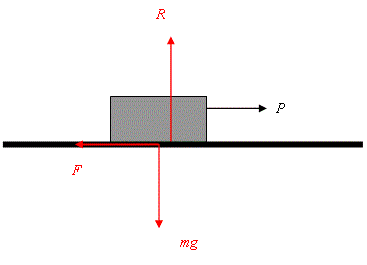Solution 3.9b
From Mechanics
(Difference between revisions)
(New page: Image:3.9b.gif Friction will "try" and prevent motion that is achieve equilibrium. <math>\begin{align} & \text{For}\ \text{equilibrium}\ P-F=0 \\ & \text{that}\ \text{is}\ F=760\ \...) |
|||
| (One intermediate revision not shown.) | |||
| Line 1: | Line 1: | ||
| - | [[Image:3. | + | [[Image:3.9bNew.gif]] |
Friction will "try" and prevent motion that is achieve equilibrium. | Friction will "try" and prevent motion that is achieve equilibrium. | ||
| Line 11: | Line 11: | ||
Also the maximum friction possible is | Also the maximum friction possible is | ||
| - | <math>\mu R=0.4\times 1960=784\ \text{N}</math>. | + | <math>\mu R=0\textrm{.}4\times 1960=784\ \text{N}</math>. |
<math>F=760\ \text{N}</math> | <math>F=760\ \text{N}</math> | ||
falls inside this maximum value and thus is the value of the friction. | falls inside this maximum value and thus is the value of the friction. | ||
Current revision
Friction will "try" and prevent motion that is achieve equilibrium.
\displaystyle \begin{align}
& \text{For}\ \text{equilibrium}\ P-F=0 \\
& \text{that}\ \text{is}\ F=760\ \text{N} \\
\end{align}
Also the maximum friction possible is
\displaystyle \mu R=0\textrm{.}4\times 1960=784\ \text{N}.
\displaystyle F=760\ \text{N}
falls inside this maximum value and thus is the value of the friction.

